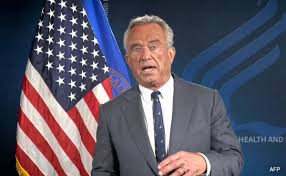
Breaking News
 Why Do We Have a Paper-Money System?
Why Do We Have a Paper-Money System?
 FULL INTERVIEW: Former CIA Counterterrorism Chief Warns That Israel Is Attempting A Stealth Coup
FULL INTERVIEW: Former CIA Counterterrorism Chief Warns That Israel Is Attempting A Stealth Coup
 RFK Jr. Declares U.S. Will Reject New WHO Pandemic Rules -
RFK Jr. Declares U.S. Will Reject New WHO Pandemic Rules -
 'An Encouraging Sign': 60% of Pregnant Women and Young Mothers May Delay or Refuse...
'An Encouraging Sign': 60% of Pregnant Women and Young Mothers May Delay or Refuse...
Top Tech News
 The Wearables Trap: How the Government Plans to Monitor, Score, and Control You
The Wearables Trap: How the Government Plans to Monitor, Score, and Control You
 The Streetwing: a flying car for true adventure seekers
The Streetwing: a flying car for true adventure seekers
Magic mushrooms may hold the secret to longevity: Psilocybin extends lifespan by 57%...
 Unitree G1 vs Boston Dynamics Atlas vs Optimus Gen 2 Robot– Who Wins?
Unitree G1 vs Boston Dynamics Atlas vs Optimus Gen 2 Robot– Who Wins?
 LFP Battery Fire Safety: What You NEED to Know
LFP Battery Fire Safety: What You NEED to Know
 Final Summer Solar Panel Test: Bifacial Optimization. Save Money w/ These Results!
Final Summer Solar Panel Test: Bifacial Optimization. Save Money w/ These Results!
 MEDICAL MIRACLE IN JAPAN: Paralyzed Man Stands Again After Revolutionary Stem Cell Treatment!
MEDICAL MIRACLE IN JAPAN: Paralyzed Man Stands Again After Revolutionary Stem Cell Treatment!
 Insulator Becomes Conducting Semiconductor And Could Make Superelastic Silicone Solar Panels
Insulator Becomes Conducting Semiconductor And Could Make Superelastic Silicone Solar Panels
 Slate Truck's Under $20,000 Price Tag Just Became A Political Casualty
Slate Truck's Under $20,000 Price Tag Just Became A Political Casualty
 Wisdom Teeth Contain Unique Stem Cell That Can Form Cartilage, Neurons, and Heart Tissue
Wisdom Teeth Contain Unique Stem Cell That Can Form Cartilage, Neurons, and Heart Tissue
RFK Jr. Declares U.S. Will Reject New WHO Pandemic Rules -

'The new regulations employ extremely broad language that gives the WHO unprecedented power,' says RFK.
HHS Secretary Robert F. Kennedy Jr. explained his office plans to reject the World Health Organization's amendments to its International Health Regulations, arguing they pose a danger to national sovereignty, and would force the US to impose surveillance, propaganda and censorship mechanisms to control the public.
The proposed amendments to the International Health Regulations open the door to the kind of narrative management, propaganda, and censorship that we saw during the COVID pandemic. The United States can cooperate with other nations without jeopardizing our civil liberties,… pic.twitter.com/k9IWRavu9D
— Secretary Kennedy (@SecKennedy) July 18, 2025
Read a transcript of RFK's message below:
Hello, everyone. This is your HHS Secretary Robert F. Kennedy, Jr. I want to speak to you today about a controversial issue that could directly impact you and your family during a global health emergency.
Last year the World Health Organization's governing body made some far-reaching amendments to its International Health Regulations, otherwise known as the IHR regulations. These regulations establish the legal framework that gives countries rights and responsibilities for managing public health events with global impact. The deadline to reject these amendments is next week and we are rejecting them so I'd like to explain to you why.
The first reason is national sovereignty.
Nations who accept the new regulations are signing over their power and health emergencies to an unelected international organization that could order lockdowns, travel restrictions or any other measures that it sees fit. In fact, it doesn't even need to declare an emergency. Potential public health risks are enough for it to initiate action. If we're going to give the WHO that much power we should at least invite a thorough public debate especially since the agreement isn't official treaty and it bypasses the US Senate which plays a key role in ensuring major international commitments receive proper democratic oversight.
To make matters worse the new regulations employ extremely broad language that gives the WHO unprecedented power. They require countries to establish systems of risk communications of the WHO can implement unified public messaging globally. That opens the door to the kind of narrative management and propaganda and censorship that we saw during the COVID pandemic. We don't want to see that kind of system institutionalized even further.
The agreement also contains provisions about global systems of health IDs, vaccine passports and a centralized medical database. It lays the groundwork for global medical surveillance of every human being. Maybe if the WHO were an infallible authority untainted by industry influence we would consider accepting the new regulation.
Unfortunately, a COVID pandemic demonstrated otherwise.
During COVID, the WHO failed to enforce the International Health Regulations that were already in place for generations. China withheld critical information about the outbreak for at least a month and faced no real consequence or criticism from WHO. As the 2024 Congressional oversight report put it, the WHO was misinformed, denied access to China and used as a cover for the Chinese Communist Party's reckless action.
These and other atrocities make one thing clear: we must strengthen national and local autonomy to hold global organizations in check and to restore a real balance of power.
Underneath all the bureaucratic language, what's at stake here is a vision for our future. Are we going to be subjects to a technocratic control system that uses health risks and pandemic preparedness as a Trojan horse to curtail basic democratic freedoms? Do we want a future where every person, every movement, every transaction and every human body is under surveillance at all times?
Now I don't want to be too alarmist; the new regulations aren't in themselves medical totalitarianism. In fact they were perhaps written with good intentions, but they are definitely a step in the wrong direction. That's why we're rejecting the amendments not only on behalf of our own citizens but the whole world. After all America could simply ignore the WHO. A few other countries are as powerful as the United States. Even though many of these amendments are phrased to be non-binding as a practical matter it's hard for many countries to resist them especially when they are dependent on the WHO funding and its partnerships. That's why we're taking leadership to stop an agreement that's bad for the entire world.
I want to be clear that in rejecting these amendments President Trump and I are not rejecting international cooperation. We can cooperate with other nations without jeopardizing our civil liberties, without undermining our constitution, and without seeding away America's treasured sovereignty. That's my commitment to you. That's President Trump's commitment to you. Thank you and God bless you all and God bless our country.



